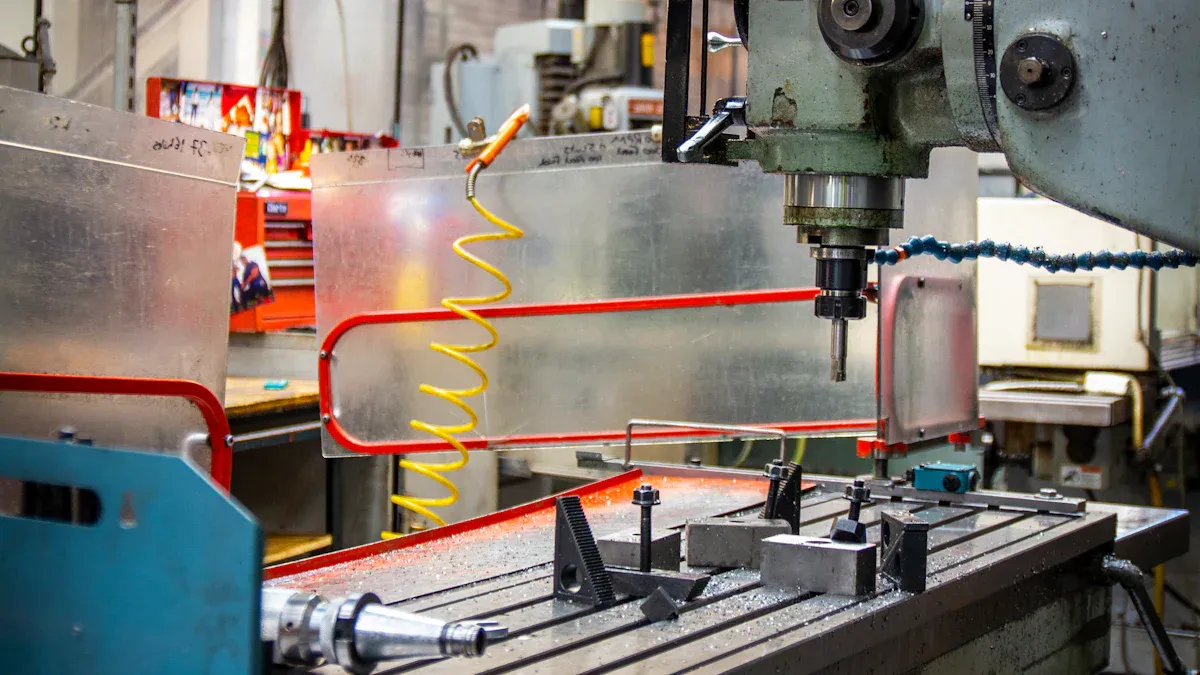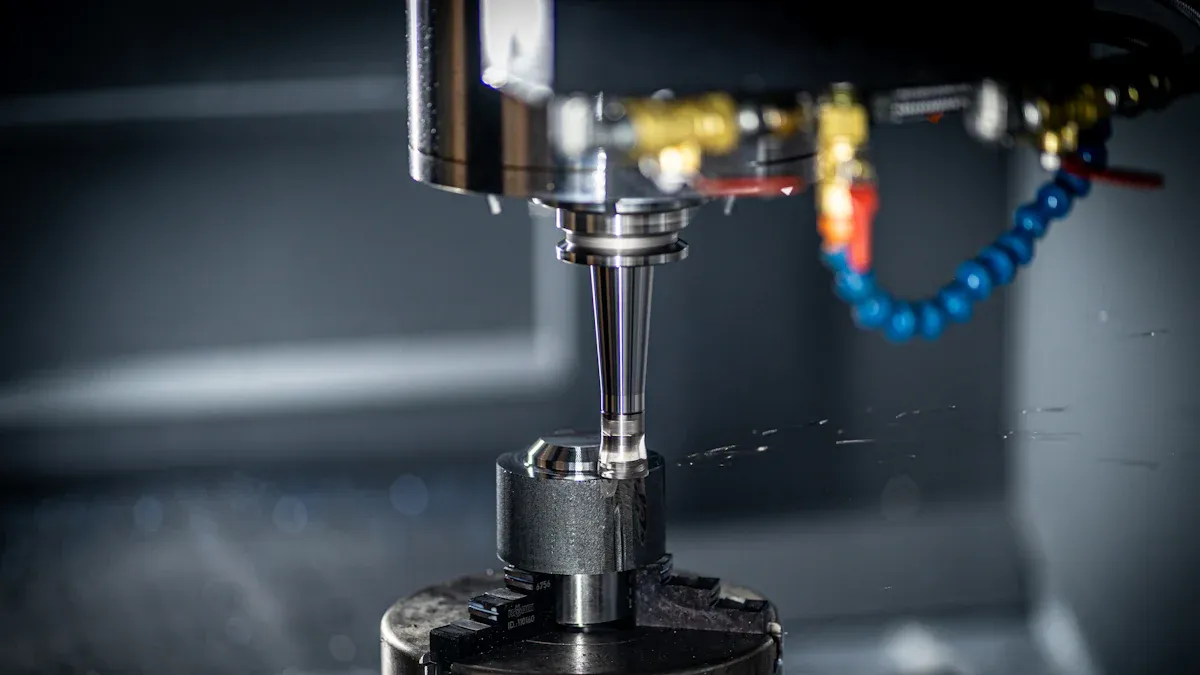How CNC Precision Machining Shapes Critical Components for Healthcare

CNC precision machining application ensures the accuracy and reliability of medical components, directly impacting patient safety. You benefit from its ability to maintain tight tolerances, which minimizes errors and prevents device failures. Better-fitting implants reduce complications and speed up recovery. Its compliance with healthcare standards builds trust and supports innovation in medical technology.
Key Takeaways
CNC machines make medical parts very accurate, keeping patients safe and devices reliable.
Custom implants made with CNC machines fit patients well and help them heal better.
Following strict healthcare rules ensures CNC-made parts are safe, work well, and are top quality.
The Role of Precision in Medical Parts Manufacturing

Why Precision is Critical in Healthcare
Precision plays a vital role in healthcare, where even the smallest deviation can lead to significant consequences. Medical devices must meet strict tolerances to ensure safety and functionality. For example:
Core wire and guidewire grinding enables access to hard-to-reach areas in the body.
Orthopedic wires require high precision to perform effectively during surgeries.
Mandrel grinding supports catheter designs with tight tolerances.
Nitinol products demand precise techniques due to their unique material properties.
Low precision in manufacturing can compromise device reliability, increasing the risk of patient complications. It also leads to higher scrap rates and failures in critical applications, directly affecting patient outcomes.
Benefits of Precision CNC Machining
Precision CNC machining offers unmatched advantages over traditional methods. It ensures consistent quality and accuracy, which are essential for medical devices. You can benefit from its ability to produce customized parts tailored to individual patient needs. This enhances compatibility and effectiveness. CNC machining also supports rapid prototyping, enabling faster development of innovative medical devices. Its material versatility allows the use of biocompatible materials, ensuring safety and durability. Additionally, it aligns with stringent regulatory standards, ensuring compliance and reliability.
Material Versatility in CNC Machining Applications
CNC machining supports a wide range of materials for medical applications. Metals like stainless steel and titanium are chosen for their strength and biocompatibility. Plastics such as PEEK and polycarbonate offer chemical resistance and versatility. Ceramics like alumina provide hardness and biocompatibility.
Material | Properties and Applications |
|---|---|
Stainless Steel | Durable, corrosion-resistant, used in surgical instruments. |
Titanium | High strength, ideal for orthopedic implants. |
PEEK | Chemical resistance, used in surgical tools. |
Polycarbonate | Impact-resistant, used in medical device housings. |
This versatility ensures CNC machining meets diverse healthcare needs.
CNC Precision Machining Applications in the Medical Industry

Manufacturing Implants and Prosthetics
CNC precision machining application plays a vital role in creating orthopedic implants and prosthetics. You benefit from its ability to produce customized patient implants tailored to individual anatomy. For instance, CNC machining uses 3D scans of bone structures to design orthopedic implants that fit perfectly, improving healing outcomes. This technology also ensures the suitability for artificial joints and the appropriateness for prosthetics by maintaining tight tolerances and biocompatibility.
CNC machining facilitates the production of fully customized implants and prosthetics, ensuring a perfect fit and reducing surgical time. Recent advancements have shown that personalized implants enhance patient satisfaction and recovery rates.
The demand for customized patient implants continues to grow as healthcare shifts toward personalized solutions. CNC machining meets this demand by delivering high-quality medical parts with precision and accuracy, ensuring both safety and effectiveness.
Creating Surgical Instruments
Precision CNC machining is essential for manufacturing surgical instruments. You rely on its ability to achieve extreme tolerances and biocompatibility, which are critical for safety and functionality. Instruments like scalpels, forceps, and endoscopic tools require smooth finishes to facilitate sterilization and prevent contamination. CNC machining ensures these high-quality medical parts meet stringent regulatory standards while maintaining cost and time efficiency.
Challenges in this process include selecting biocompatible materials, achieving precision and accuracy, and navigating complex FDA and ISO regulations. Despite these challenges, CNC machining consistently delivers reliable and durable instruments that support successful surgical procedures.
Producing Diagnostic and Imaging Equipment
CNC machining in the medical industry also contributes to the production of diagnostic and imaging equipment. You benefit from its ability to create intricate and highly accurate parts essential for devices like MRI machines and CT scanners. Multi-axis machining and advanced tool path optimization enhance accuracy and consistency, ensuring these devices meet strict patient safety standards.
The precision of CNC machining accelerates the development of innovative medical technologies. Quick prototyping and efficient production enable faster delivery of life-saving equipment to healthcare providers. This ensures that diagnostic tools remain reliable and effective, directly impacting patient outcomes.
Meeting Healthcare Standards with CNC Machining
Ensuring Compliance with Industry Regulations
You must ensure that CNC machining processes comply with strict healthcare regulations to guarantee the safety and reliability of medical devices. Regulatory bodies like the FDA and ISO set stringent standards for medical parts manufacturing. These include:
Compliance with FDA regulations to ensure product safety and efficacy.
Adherence to ISO 13485 for quality management in medical device manufacturing.
Meeting ISO 9001 standards for precision and quality assurance.
CNC machining facilities must also maintain robust documentation protocols. This ensures traceability and accountability throughout the manufacturing process. By following these regulations, you can trust that CNC machining delivers safe and effective medical applications.
Quality Control in Medical Parts Manufacturing
Precision CNC machining relies on advanced quality control measures to meet the exacting standards of the medical industry. Key practices include:
Precision engineering to achieve ultra-accurate specifications.
Integration of advanced quality control systems to monitor production processes.
Reliable documentation to ensure traceability.
Regular calibration and maintenance of CNC machines to maintain accuracy.
Compatibility with high-performance CAD/CAM software for complex designs.
These measures ensure that medical parts meet strict tolerances and maintain consistent quality. You benefit from reduced errors, improved reliability, and enhanced patient safety.
Driving Innovation in Medical Technology
Precision CNC machining drives innovation by enabling the development of complex medical devices and personalized solutions. Automated machining improves accuracy and productivity, while hybrid manufacturing combines CNC machining with 3D printing to create intricate geometries. The use of advanced materials and coatings enhances the performance and biocompatibility of medical parts.
Emerging trends like robotics and machine learning are revolutionizing CNC machining applications. These technologies improve production efficiency and design flexibility, allowing you to create cutting-edge medical devices that meet strict safety standards. As a result, CNC machining continues to play a pivotal role in advancing patient care and medical technology.
CNC machining transforms healthcare by enabling precise fabrication of critical medical parts. Its applications in implants, surgical tools, and diagnostic devices improve patient outcomes. Emerging trends like miniaturization, automation, and advanced materials enhance customization and efficiency. You can rely on CNC machining to drive innovation and meet the growing demand for personalized medical solutions.
FAQ
What makes CNC machining suitable for medical applications?
CNC machining ensures precision, biocompatibility, and compliance with healthcare standards. You can rely on it to produce safe, durable, and highly accurate medical components.
How does CNC machining support innovation in healthcare?
CNC machining enables rapid prototyping and customization. You can develop advanced medical devices faster, improving patient outcomes and meeting the growing demand for personalized solutions.
Can CNC machining handle complex medical device designs?
Yes, CNC machining excels at creating intricate geometries. Multi-axis capabilities allow you to manufacture complex parts for implants, surgical tools, and diagnostic equipment with high accuracy.
See Also
Streamlined CNC Machining Solutions for Accurate Production
Exploring CNC Machining Accuracy Within Aerospace Applications
Recognizing CNC Machining's Role in Precision Manufacturing Processes
Perfecting CNC Machining Techniques for Precision Component Production
The Impact of CNC Machining on Advanced Precision Manufacturing
About US
Follow Us
Your prototype holds unparalleled significance, and we deeply value its uniqueness. Collaborating with you during the preparation phase for running your prototype or parts is a commitment we gladly embrace. Whether it's a single part or a complex assembly, we are dedicated to selecting the optimal tools and pathways to bring your envisioned product to life.
At Precision Fab CNC Machining, we specialize in producing parts for prototypes, short runs, and high-volume production. Our prototyping machine capabilities extend across metal, plastic, and wood machining, with welding fabrication services available to complement and finalize your prototype if required.
Address
Address: Room320 10F, Building A,Nanshan international building, Dayawan District, Huizhou, Guangdong, 516001 China
Contacts
billy@timaycnc.com

